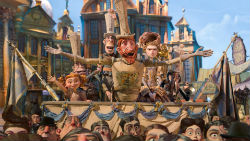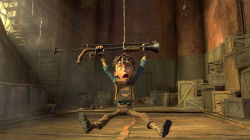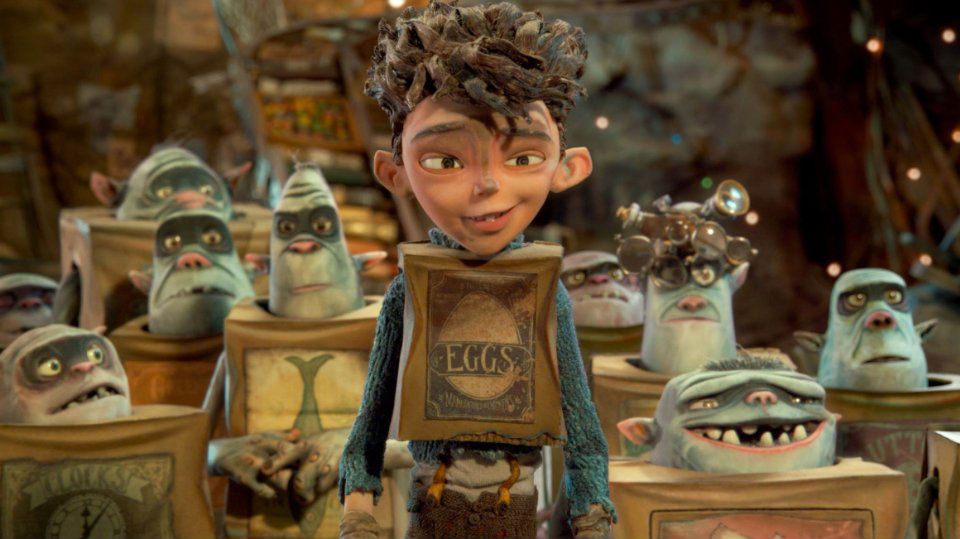Two of the more interesting characters in The Boxtrolls are Mr. Trout (Nick Frost) and Mr. Pickles (Richard Ayoade). They are evil henchmen.
The fact that they don’t know they are evil henchmen serves as an unintentional reference point for why this animated film is mostly uninteresting. It suffers from a narrative disorientation that makes what is otherwise a technically laudible animation experience into something vapid. But in narrative filmmaking, the storytelling is an inextricable part of the technical whole. So this film works by trying to create the illusion of movement you might expect from a guide who’s attempting to cover up that there’s little sense of direction.

The film (another stop-motion 3D offering from Laika Studios, home of Coraline and ParaNorman) begins with a flashback in which the Victorian era townspeople of Cheesebridge comes to believe that underground creatures known as boxtrolls exist to kidnap and kill children. However, the minute we encounter Archibald Snatcher, a snarly pest exterminator who is charged with eliminating the boxtrolls, we’re left to question what we’ve been told about the cardboard creatures.
On the basis of the rumors concerning the boxtrolls, Snatcher has an agreement with Lord Portley-Rind that when all of them are killed, he will become a member of the highly exclusive cheese-loving town council known as the “White Hats.”
Cheesebridge is a leaning tower of cheeza that stinks of hypocritical elites enjoying excess at the top while everyone else wallows underneath them in a destitute foundation that cannot stand. At the top, the White Hats are only concerned with power and maintaining the pretense of deserving their position. In part, then, enacting this pretense plays out through preserving town loyalty around a common enemy. A threat to the children is a threat to everyone, and so the Cheesebridge people are precariously united by the mythical threat of boxtrolls.
In a sense, everyone is motivated by self-preservation except for Snatcher, who might better be characterized as wanting upward mobility to elite status, however allergic he is to cheese.
Note that I haven’t mentioned either of the protagonists to this point. “Eggs” (Isaac Hempstead Wright) is the baby boy who disappeared from among the townspeople. Snatcher has the townspeople convinced that the boxtrolls have brought harm to the long-lost boy; however, we discover with Winnie (Elle Fanning)—Portley-Rind’s disregarded daughter—that, in fact, the boxtrolls have been caretakers of Eggs for the first ten years of his life.
Together, then, Eggs and Winnie aim to clear the soiled name of the boxtrolls and restore peaceful coexistence between boxtrolls and human beings by ending Snatcher’s reign of terror and misinformation.
There are some moral lessons attached to this plot: take care of orphans, be an attentive parent, and a heavy dose of “be yourself!” But they’re superficial and add don’t add much. Here’s the essential problem, then, with The Boxtrolls: Its protagonists have mostly uninteresting desires, face uninteresting conflicts, and embody little to nothing that is particularly memorable, save for a couple of one-liners here and there (the shaking hands gag may at least provoke a smile, if not a chuckle). Eggs and Winnie are forgettable characters involved in a thin plot with other especially predictable characters.
This is more irksome than boring because, on the whole, Eggs and Winnie are the only two likable human beings in the movie. And they’re kids. Nearly all of the other human beings—and most, if not all, of them adults—are some variation of idiotic.
The implication here is that the only mature human beings are kids, and one of them was raised by boxtrolls. If the big takeaway in the end is “be yourself,” then one wonders what essentially human quality might fit that directive in the world of this film. Put differently: What ought being human look like?

I don’t see much of a compelling answer in the boxtrolls or The Boxtrolls. One is more likely to leave this film with the thought that maybe human beings can start being more like boxtrolls, and the content of even that imperative offers little encouragement.
That said, Laika’s stop motion animation has never been more impressive to watch on screen. The inventiveness embedded in every detail of Cheesebridge’s world surpasses the inventiveness of the boxtrolls. Its brilliant technique creates an illusion of motion for the characters.
And yet, part of the illusion here must include creating characters who feel human to the viewer. That is to say that part of animation is animating characters with human qualities—a special sort of liveliness. The Boxtrolls exhibits wonderful achievement in stop motion animation, but it delivers lifeless characters.
Mr. Trout and Mr. Pickles are henchmen devoted to Archibald Snatcher, and they’ve been convinced, much like the townspeople, that they’re the good guys committed to getting rid of evil monsters. I suppose there’s another thin moral here about the human tendency to devolve into fear mongering—particularly as it relates to “others.” I would appreciate a film which thoughtfully explored that line of thought—plenty certainly have done so quite well—but I can’t help but think that The Boxtrolls lacks any worthy direction to do so.
For most of the film, Trout and Pickles suffer the worst form of narrative disorientation—they have no clue whether their works are for good or evil. The conclusion to their story of lostness doesn’t give many details as to the difference between those. And that casts a dull redemption. They’re like the traveler who stumbled upon the correct destination by sheer luck, and couldn’t return or tell someone how to get there if she tried.
I felt indifferent when the end credits rolled, and that’s rooted in the film’s failure to simply tell a good story populated by great characters. If you don’t give us that, we’re bound to lose our way.
Caveat Spectator
The Boxtrolls features a dark world with some disturbing creatures and moments. The film relies on a general thrust of cynical thematic tones, including comedy that is reliant on innuendo that can’t adequately be described as “mature.”
Nick Olson is Assistant Professor of English at Liberty University, and he writes on film for Christ and Pop Culture and Filmwell. You can follow him at @Nicholas_Olson.











